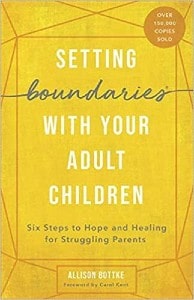
The War of Words
In this Adventures in Odyssey drama, a carelessly uttered word from Eugene creates havoc as it becomes the fashionable insult, resulting in a lesson about the power of words.
Home » Episodes » Focus on the Family Broadcast » Establishing Healthy Boundaries With Adult Children (Part 2 of 2)
Preview:
Allison Bottke: I got a call because I, my name was on his lease. I paid for the house, for a lease, I put my name on it, and it was a nightmare when I walked into that house after a SWAT team … You don’t even … You see it on TV, but you can’t comprehend what it’s like in reality. And the house itself was a trash can, I mean there were just bottles everywhere. It was New Year’s Eve, there would have been a party there, um, but it was, it … I walked in there, I thought, “This is … No human being should live like this.”
End of Preview
John Fuller: Well that’s Allison Bottke sharing, uh, just part of her dramatic story as, uh, she told it last time on Focus on the Family, describing some of the heartbreaking situations that she experienced with her adult son, Christopher, and the introspection she had to really go through to figure out what’s going on? Allison is back with us today to share more, and your host is Focus president and author, Jim Daly, I’m John Fuller.
Jim Daly: Uh, John, my heart aches for parents like Allison, who have struggled to raise, and encourage, and support their children, uh, yet nothing seems to help these young adults succeed, um, by whatever measure we’re measuring that by. Uh, maybe you know what that’s like, maybe you’re in that, uh, period of your life where your adult children are struggling and you’re not quite sure what to do. Uh, you may have a prodigal who’s walked away from their faith. Um, that’s probably the scariest, uh, position a Christian parent can be in. Or your adult child is living with their boyfriend or girlfriend, another common phenomenon, whether you’re in the church or outside the church. And maybe they’re still living in your home and seem to have no motivation, no plans for moving out, and you’re worried about that future. Uh, we know a lot of families are in that boat, uh, maybe not in the same area of the sea, uh, where the storm is really cooking, but you’re heading toward that, uh, difficult area. As we shared last time, we want to help you change the dynamic of what’s going on in your family. That means identifying the problems, uh, recognizing the mistakes you’ve made in the past as a parent, and then developing a plan of action to create healthy boundaries and ultimately entrust your adult child into God’s hands. We had a great conversation with Allison, uh, Bottke last time and I’m looking forward to more of this today and more of the solution that she’s written in a- a great book called Setting Boundaries with Your Adult Children, Six Steps to Hope and Healing for Struggling Parents, and we’re gonna cover those six steps today.
John: Yeah, and if you’d like to get a copy of Allison’s book, we do have that, of course, here at Focus on the Family. Our number is 800, the letter A, and the word FAMILY, or stop by focusonthefamily.com/broadcast.
Jim: Allison, uh, welcome back to Focus on the Family.
Allison: Thank you for having me.
Jim: Uh, well we shared part of your story last time about how your son, Christopher, uh, struggled with drugs, and the wrong friends, and all those things that we, as parents, are concerned about. It did, actually even led to illegal activity and various other problems throughout his young adult life. You’ve admitted or talked about what you did to enable him over the years, uh, as a loving mom trying to help him the best way that you knew how. I think all of us as parents have that part of our heart that we’re saying, “Yes, we want to help.” Um, some may have a better guard about whether that help will be, uh, the best thing for that child or if withholding some of that help could be the better wisdom, and we mentioned that last time. You finally came up with a strategy for parents who are in that same trap that you found yourself in and it’s based on a word that you’ve come up with called SANITY, I love that, uh, we all need sanity as parents, and we’re gonna hit that today. Let’s start with that quick overview. What does SANITY, the acronym, what does it stand for?
Allison: Sanity is what we get when we learn how to set healthy boundaries (laughs) and live a life that pleases God. (laughs) So for me, I was going through the insanity, the gerbil wheel of insanity that really motivated me to think, “Okay, I want off this gerbil of insanity, what do I need to do?” And I, at that moment, I didn’t think of SANITY steps, it was, “I have to stop, I have to stop what I’m doing right now. I have to stop behaving the way I am, I have to stop my actions,” so I wrote down stop. So it was a whole process, Jim, though, to go through finding these- these SANITY steps. I knew I had to stop repeating the same behavior and expecting different results. And I knew I needed help, I needed to be around people that would hold me accountable, that I could learn from and grow from. I started therapy, I started, uh, really loo-, reading everything I could on boundaries. I didn’t realize the issues I had, so I-
Jim: Right.
Allison: … needed to be around, so that “A” was assemble support of people. And I wrote, assemble people. (laughs) Nip excuses in the bud. I had to stop making excuses, not just for my son’s behavior, but my own.
Jim: Right.
Allison: (laughs) So that was, okay, nip excuses. And I had to implement some kind of a plan. I would … I’m a proactive woman, I was a businesswoman. I said, “Okay, I can do this. I need a plan; I need a plan of action. I need something tangible that I can look at and write down and actually do that- that’s tangible,” so that was implement a plan. “T” was trust the spirit. I had to trust that God was in control and I so often-
Jim: Hm.
Allison: … went over him.
Jim: Yes.
Allison: And- and- and this is really … Well, that’s how I, that connection really … When the SWAT team raided my son’s house and I was standing there dumping out liquor, I heard the voice of God say, “You, uh, stop- stop- stop, you can’t do this.” I think, “Okay, I- I can’t. I have to stop this; I have to trust that voice.” And a lot of parents, and I found this to be very true, a lot of parents will say, “I knew I was doing something wrong; I knew it wasn’t right, I knew I should’ve stopped, I knew when he asked me for more money I shouldn’t have given, but I just didn’t listen to that.” So we’re praying for wisdom and discernment, we need to listen when it comes, (laughs) you know-
Jim: Yeah.
Allison: … so that’s the trust. And “Y” is yield everything to God. I, you know, that doesn’t mean give up every, it doesn’t mean give up, I’m just tossing in the towel, but it means trusting that he knows best. And if I’m leaning on him and praying for wisdom and discernment, I- I need to follow that- that- that growth that I’m going through and experience the pain. I needed to experience the pain so my son could eventually experience it, and that’s a hard thing-… and to trust that God’s gonna take care of him.
Jim: Right, and that would be the most difficult, I think, for any of us as parents. But let’s now go back and let’s, uh, dissect all this, ’cause I think this is the helpful part of the two-day program and I want to make sure we do put, um, thoughts and- and good, um, ideas forward for the parents who are struggling.
Jim: Starting back with “S” for-
Allison: Mm-hmm.
Jim: … stop negative behavior, give examples of what parents are doing wrong to enable their adult children.
Allison: Stop the flow of money is a big one. Uh, for things that have to stop, it’s very individual for all of us, we’re not all making these, you know, th- this- this like mistakes. But typically the big ones are stop the flow of money, stop making excuses, stop coming to the rescue-
Jim: Hm.
Allison: … you know, stop being a landing pad for your child. You know, stop your own issues, stop your own swooping in, stop your own, your own fear. If you, if you could stop fear-
Jim: Hm.
Allison: … if you could stop- stop, you know, stop, uh, being, a- a- a prisoner to fear and guilt-
Jim: Hm.
Allison: … and that’s, that- that … So there’s a lot of stops.
Jim: Hm.
Allison: I wrote, I had pages of stops, Jim, that I wrote down.
Jim: No, that’s good.
Allison: It’s-
Jim: An, uh, E- Edna was a woman that was working three jobs-
Allison: Hm.
Jim: … and what was she doing with all that energy and the money she was making from three jobs? Why was she working three jobs?
Allison: She was covering the car payment for her daughter, who had this very fancy SUV. She was buying clothes and food for the three grandkids. She paid for her daughter’s auto insurance. Uh, she paid for just about ev- everything and had to take these jobs, extra, to afford it. And I met her at a yard sale, (laughs) and I just, kind of, looked at her and it taught, uh … I’ve become very outspoken about this issue, (laughs) um, about the- the boundaries and what, ’cause I would ask, I asked her, “Why are you doing this to your detriment,” because she was tired, she was exhausted. She had to jump in her beaten up … I saw her car, a broken-down vehicle (laughs) and- and, uh, her daughter is driving a fancy, you know, Navigator SUV that she’s-
Jim: Brand new-
Allison: … paying for-
Jim: … yeah.
Allison: … yes. And I think … And I asked her, I said, “Why don’t you think you deserve a decent vehicle? Why don’t you think it, your time, you know, to …? Don’t you deserve not to work so hard,” you know?
Jim: Yeah. Uh, let’s move to the “A” in SANITY. The A stands for assemble, uh, a support group. Why is this critical for parents who are struggling and what do these support groups look like?
Allison: See, a- accountability is a key factor here. You know, if that’s in your church family … Um, a lot of parents don’t want to bring up the challenges that we’re having with our kids, especially if drugs are involved or, um, incarceration, or the- the kids are in and out of jail, if they’re in and out of relationships. Um, you know, I- I’ve talked to parents who have daughters who have f-, three, four, five kids, all by different fathers, you know, so it- it’s a nightmare what a lot of parents are living with right now.
Jim: You know, often, uh, Allison, I talk about that as chaos.
Allison: It is chaos.
Jim: You know we have a great series-
Allison: Yes.
Jim: … by Ray Vander Laan, talking about That the World May Know, and Ray’s a good friend. And that’s one of the teaching points that he’ll, uh, provide that, uh- uh, Jesus came to bring God’s shalom, his peace-
Allison: Yes.
Jim: … to a world of chaos. And chaos entered the world when sin entered the world, and that’s what’s your describing, just this everyday chaos that begins to-
Allison: Ins-, uh-
Jim: … occur-
Allison: … insanity. Yeah, that’s … Then-
Jim: … and it’s insanity.
Allison: … it comes back to … That’s the, to the extent.
Jim: So this group, uh, a- a, e- … I can imagine that some of these parents, we feel like we’re learning this almost just experientially and it’s, you get into a corner of a room, and you’d say, “Hey, are you experiencing this with your adult child,” and “Yeah, by the way, I am, and, you know …” And then you start to figure out, wow, that’s not working very well. But it is almost like a code of some sort between parents, ’cause we don’t know if we’re doing it well or- or not doing it well.
Allison: Uh, well, and especially there’s a, such a- a- a pressure in Christian families that- that we feel we’re supposed to be behaving in a certain way, and our kids aren’t supposed to be doing this, and, you know, I- I was a young believer when I was in church realizing … And I looked around, I said, “Nobody around me could possibly have a son like mine.” I think, uh, you know, he’s in and out of jail and- and- and- and the situation, they just … But once I started talking about it, I was stunned at how many people who said-
Jim: Yeah.
Allison: … I’m at that same place.”
John: Hm.
Allison: So, uh, when you can be around other people and realize you’re not alone.
Jim: Allison, uh, let’s go to “N” for SANITY. Uh- uh, it stands for nip excuses in the bud. What are some of those typical excuses that a dysfunctional adult child will try, uh, to use on their parents?
Allison: (laughs)
John: Hm.
Allison: The … Well they- they’ve become, sadly, um, have become master manipulators in many instances.
Jim: What does that look like?
Allison: Uh, it’s so-
Jim: I think I know it, but-
Allison: Yeah-.
Jim: (laughs)
Allison: … it’s- it’s, like, uh, you know, “I- I couldn’t get to work because my car broke down because I didn’t have the money to fix my car, so I didn’t go to work, so I need you to loan me this money so I can get this.” Uh, and it’s one excuse after another, you know, it … You can take a bus, walk, uh, do something, you can get there if you need to go. Yeah- yeah, um, so that, um, that nip excuse is- is a big one for me, for my s-, with my son grew, when he was in his 20s and early 30s was the cell phone. I paid for his cell phone, and it got to be very expensive, uh- uh, and he, of course, told me he would pay me back. (laughs) And, uh, that- that happened m- multiple times, I didn’t get paid back, and there I am, uh, you know, in- in major debt, um, paying for this. Uh, but- but, like, the excuse was, if he doesn’t have a phone, he can’t call me, or I won’t be able to know if he’s safe or not. You know, like he ever really called me a lot on this phone, (laughs) you know, it was, I’m paying’ for it, but I didn’t hear from him for … You know, so the excuses are, they’re rampant, uh, in- in-
Jim: What did, what did … In that, uh- uh, regard with nipping it in the bud, you were in the courthouse, and you had a realization about how oblivious Christopher-
Allison: Yeah.
Jim: … was to your pain.
Allison: Uh- uh, yes.
Jim: What happened in that courthouse-
Allison: Yeah, I-
Jim: … that, um- um, caught your attention?
Allison: I am a, uh, very emotional person, (laughs) um, and I was sitting there watching him go through this, watching … They- they walked him out with the shackles and the orange suit, and, um, and- and I started to cry, and I’m trying’, you know, I’m- I’m- I’m not, like, weeping crazily, but I’m, you know, definitely sad. Um, and I found out later that he had called a friend of mine, um, and said that I was just trying’ to get sympathy, that I was just trying’ to, you know, make it all about me. And I said, “Well, I don’t understand this, (laughs) ’cause it’s not all about me, I’m caring for you. I’m sad at what’s happening.” But at that point I had stopped bailing him out. He knew, he was there, I wasn’t bailing him out.
Jim: Mm-hmm, so he was-
Allison: Um, and-
Jim: … trying’ to, maybe, manipulate you.
Allison: S- so it, e- exactly. So there was a, you know … It’s all, it all gets so convoluted when we’ve been on this gerbil wheel of insanity for so long to extricate ourself from this, and really step back and look at what the next steps are is critical, because we’re all, we’re caught up in the chaos, and the insanity, we’re caught up in fixing, we’re caught up in- in the fear, in the shame, in the guilt, and until, that’s where “S”, uh, comes in, so we can stop and step back, we’re not gonna be able to nip any excuses, we’re not gonna be able to get support, we’re not gonna be able to do any of things until we can separate ourselves from our children’s actions- (laughs)
Jim: Mm-hmm.
Allison: … you know, and then, and see how much of us, uh- uh, you know, i- is involved in this with, uh, what- what choices we’ve made that have contributed to this. Um, I often think if I hadn’t started to bailing him out so soon things might have changed from his history, because I would bail him out and made excuses. “Well you can’t stay in jail, I’m gonna bail you out. You can’t … My son can’t be in jail.” Well he should very well have been there because he did something incredibly wrong and there’s consequences, you know. And it’s, uh- uh, he never had to experience consequences for a long time-
Jim: Mm-hmm.
Allison: … because I bailed him out all the time. So, uh- uh, and when you get to that realization as a parent, it’s hard, because it, then we want to beat ourselves up, you know, and- and that’s not gonna serve any purpose either. So, that’s part of that nip excuses, you know, ‘This is happening to my son because I was a bad parent.” That’s not it at- at all. You know, I did make poor choices, so did he, we all do. God’s gonna forgive me and- and- and then al-, then allow- allow me to move on, but what’ll, what does moving on look like?
John: Hm. We’re talking to Allison Bottke today on Focus on the Family with your host Jim Daly and we certainly do recommend her book, Setting Boundaries with Your Adult Children, Six Steps to Hope and Healing for Struggling Parents. Uh, we’ve got copies of that book here. Give us a call if you’d like one. Uh, if you can donate, please do and if you need to talk to a counselor, uh, they’re here for you. Our number is 800, the letter A, and the word FAMILY, or stop by focusonthefamily.com/broadcast.
Jim: Allison, uh, we’ve covered the “S”, the “A”, and the “N” of SANITY, now let’s talk about the I, which you have as implement rules and boundaries. This probably is the most difficult and we- we can recognize-
Allison: Yeah.
Jim: … where we’ve fallen short as a parent, our own, uh, you know, misgivings, et cetera.
Jim: Uh, when we talk about implementing rules and boundaries, um, and that comes out of Galatians 6 I believe, carrying each other’s burdens, uh, how do we do that, how do we begin to, uh, set those rules and boundaries, and really change our own behavior?
Allison: Uh, that’s exactly what it is- (laughs)
Jim: Yeah.
Allison: … it’s changing our own behavior. Um, being able to have a action plan is critical. If you don’t have anything to aim for, uh, well- well what’s that saying go, “You, you’ll h-,
Jim: “You’ll hit”-
Allison: … you’ll hit nothing every time.”
Jim: Right- right.
Allison: Um, so we’ve gotta have a plan. What’s the outcome that you want as a parent? Is it for your child to launch? Maybe not. Or is it to, perhaps, help them through addiction, or is it to know if you’re supposed to take care of your grandkids, ’cause a lot of parents now are taking care of grandkids because their kids can’t-
Jim: Right.
Allison: … because they’re either in jail, or prison, or they’re addicts and they aren’t- aren’t capable, so it’s- it’s really l-, what is it that you, as a parent, uh, what do you feel that you need to do? What- what- what- what’s the next step, what are expectations, and- and wr- write that down. I’m a big believer, I’m a writer, I’ve s- … I’m a big believer in writing things down, uh, so we can see it, ’cause we don’t know, won’t- won’t remember in the, in that, in that throe of emotion-
Jim: Right.
Allison: … that we’re so often in. Uh, and if we’re communicating with adult children that are dysfunctional or troubled, they may not remember. So, I’m a big, you know, proponent of writing things down to plan and presenting it to our adult child if they play a part in this, such as m- mo-, maybe moving out or, uh, or-
Jim: Yeah.
Allison: …, uh, what it is that that looks like. Do you, um … And- and, uh, if you’re going to no longer give money, if you’re no longer gonna support them, or they have to do this in order to get that, you’ve gotta write that down. So that plan … I had to write down everything, what I, how I saw my life, uh, what the steps were.
Jim: Mm-hmm.
John: Yeah, this is not, uh, because of a troubled, uh, adult child, but we had two girls living with us, uh, for, uh- uh, about a year each, uh, for, um, some college time, and I finally had to, kind of, set a boundary for my wife and myself and say, “You know what, we’ve been parenting a long time, and we’ve loved having you, but it’s time for you to move on. (laughs) We need some room for ourselves.” Now that- that conversation went down pretty well. What do you, what do you do if the child doesn’t get it?
Allison: Well, uh, well and some of ’em don’t get it. And- and I, uh, I’ve, I have chapters on dealing with anger, especially … It- it depends on what situation your child i- is dealing with. There are mental and emotional illnesses. We’ve got a lot of kids that are, um, bipolar, that are depressed, that are, uh, that are addicts, you know, so, uh, what are they capable of- of doing? You’ve gotta be aware of this, if that, um, and if they’re showing psychopathic behavior. There are some- some kids that, uh, they don’t have empathy, they don’t have sympathy, they don’t, they don’t, they, th-, and- and they can get extremely angry, so you gotta be prepared. If you are gonna set this boundary, what, uh, might happen, and brainstorm the heck out of that in your support group.
Jim: Mm-hmm.
Allison: Uh, he might, you know, get physical, what am I gonna do and- and, um, be prepared to do it. If you’ve gotta call and get a restraining warrant, you, that’s what you have to do.
Jim: Hm.
Allison: So there are … It- it’s hard, but if you start looking at it, and writing this down … And on the other side of that coin, it’s not all negative, the other side. A lot of our kids don’t know what they’re capable of accomplishing-
Jim: Mm-hmm.
Allison: … because we’ve been accomplishing it for them.
Jim: Yeah.
Allison: So when we step back, there’s a- a very strong possibility that these kids are gonna get a clue, and get a grip, and be able to move forward. We’ve just, uh-, you know, been hanging onto ’em for too long. You know, so we’ve gotta have that hope that if we can, if we can weather this storm, (laughs) uh, they- they may come out on the other side, uh, you know, incredibly independent and- and feeling self-respect, feeling that they’ve done something good. You know, uh, when you’ve been taken care of all these years, you know, and now- now it’s up to you to do it, and you make these small successes, that’s pretty a- amazing for young people. You can see the changes that they, that- that happens in their life.
Jim: Exactly.
Allison: Uh-
Jim: Allision, uh, we gotta get through the other two-
Allison: (laughs)
Jim: … letters, uh, the “T” and the “Y”. “T” is trust your instincts, Y, yield everything to God. Um, the- the trusting of your instincts, uh, um, oftentimes that could be born out of fear. And your instincts m- may be right, but you have to, I think, be checking with other parents-
Allison: Uh, um, the A- (laughs)
Jim: Yeah-
Allison: … is.
Jim: … that- that is, you know, to have the network, uh, to be able to do that. But- but normally instincts are correct, uh- uh, I don’t want to understate that, but I’m just thinking sometimes fear can overplay that instinct that you have, but you should always be listening to your heart, let me put it that way.
Allison: Yeah, and yes, and- and being able to trust that and- and deal with the fact that you may go through some pain and- and f- f-, you know, fear through that stuff.
Jim: What’s an example of that for you?
Allison: I have a really good one. There- there was a- a woman who contacted me, uh, who’s … And- and this actually happens a lot. Parents are saying, you know, that their kids have fancy cars, and they’ve got money, and- and they’ve got all these, you know, they’re taking trips, they’re doing, and- and yet they’re still living at home. This son was living at home, drove a fancy car, had a fancy motorcycle, had a lot of money, and wasn’t really working. She didn’t see, you know, the mom didn’t see him really go out to work much, so she’s, kind of, giving excuses to herself how, you know, how does he, how is he affording this? It turns out, he was dealing drugs, had- had dug a hole, drilled a hole in the floor of his bedroom, and had a floor safe put in the house underneath the carpet. Um, he was arrested. The police came in t- t, you know, um-
Jim: To mom and dad’s house?
Allison: … to mom and dad’s house and- and searched the whole house, found this floor safe filled with money and drugs, cocaine, a lot of cocaine. Mom is really clueless to this, but the police aren’t buying that she’s clueless to this. She ended up getting arrested and ended up, um, being an accomplice. They said, “How …” And she had to clear her name, it cost her a lot of money for attorney fees to clear her name. She wasn’t an accomplice, but it’s her house, she’s paying the bills, he’s living there right with her. How on earth could she not know that he’s doing something illegal-
Jim: Huh.
Allison: … when he’s driving this, you know, and not working. So she ignored these feelings and she said to me, “I- I just knew something’ was wrong, I just didn’t know how to …” She didn’t have a support group at that time, she didn’t know how to, what she was gonna do. Um, and it was, uh, it was tough. And you see these, I see these stories unfolding often and it’s-
Jim: Yeah.
Allison: … frightening, uh, so.
Jim: Yeah, I mean that’s, I mean trusting your instincts is a good rule of thumb and formulating how to approach that with your adult child, et cetera, really important. Yielding everything to God. That sounds so easy, but probably the most difficult.
Allison: Well, yeah, I say, giving in, you know, isn’t, uh, isn’t giving up. So sometimes we have to realize that we’re gonna go through a mess for a while. I’ve got this plan now, it’s gonna be tough, but God you’re gonna help me, you’re gonna help me get through this and y-, and yield that. And, um, and- and letting go of expectations is really a critical thing, um, and to expect that, um, God is in control, I’m gonna walk through this one day at a time, and trust that- that- that the plan is gonna work out. Um, but do realize it’s gonna be painful, so that’s the bottom line. It’s, and- and that being able to be painful is having your support group that you can lean on, you know, and- and- and it all ties together, stopping, you know, beating ourselves up. Talk to a counselor if you need to, it’s- it’s so intricate in- in this, um, surrender, uh, which is what it is, it’s surrendering that, okay, you know I’ve made some mistakes but I’m, it’s a new day, it’s a new dawn, um, I’m moving forward, and we’ll see what happens. And-
Jim: You know, Allison, uh, that old cliché of letting-
Allison: Go and let God.
Jim: … go and let God, uh, do his thing with your adult child-
Allison: Yeah- yeah.
Jim: … sounds so easy, it sounds so good, but it’s not.
Allison: Not it’s not, it’s not easy, (laughs) it’s not easy, so, you know, m- m- my son now is- is a believer and strong believer, and, uh, has been free of heroin for twenty some years now-
Jim: Hmm.
Allison: … um- um, but h- has a real challenge with pain meds. You know, after being in so many accidents, so many motorcycle accidents, is he’s now rea- reaping the, you know, the- the consequences of a very rough lifestyle. Uh, and for me, I don’t, no I’m not bailing him out, he’s- he’s in prison. I’m not, you know, he’s- he’s serving time, so it’s, uh … That surrender is, you know, trusting that God’s gonna bring him around has- has been a- a very positive thing for Chris. You know, he’s exactly where I think God wants him to be. He’s learned the bible back and forth, he’s in a- a prison fellowship study, so he’s looking at life in a very different way now, but it’s taken a long-
Jim: Sure.
Allison: … time. It’s, uh-
John: Hm.
Allison: … uh, and to respect, you know, that he knows now I don’t … He- he does, he won’t ask for money to bail him out ’cause he knows that’s not gonna happen. So-
Jim: Right.
Allison: … so we’ve- we’ve now developed a different connection.
Jim: Yeah, that-
Allison: So-
Jim: … dependency-
Allison: Yes.
Jim: … is over.
Allison: For parents to develop a true connection with their-
Jim: Right.
Allison: … with their adult kids is important, not the, not the symbiotic one where you’re bailing them out all the time, but a true-
Jim: Yeah.
Allison: … for, you know, connection.
Jim: You describe, um, the need to apologize as you develop that action plan with your adult child, the parent should apologize to the child. What- what does that apology sound like?
Allison: It- it’s, uh, “I’m sorry that I didn’t trust you enough to live your life. I’m sorry I didn’t give you the independence that you needed-
Jim: Hm.
Allison: … to grow on your own. I- I’m sorry that I kept, uh, bailing you out, uh, and I, and I’m sor-, I’m sorry that I didn’t believe in you enough. And this is, I had to, and I’m sorry I, that I didn’t take care of myself.” And that makes me sad now because so many parents are going through this, and they aren’t taking care of themselves. God has a plan for us as well as our kids, so if we don’t know what that plan is, and we aren’t trusting in him, and we aren’t depending on him, and really walking that faith walk, things are, uh- uh, are just, uh, they’re- they’re gonna continue on that gerbil wheel, they’re never gonna get fixed. So that’s what the apology … It’s- it’s really saying, I’m sorry and that I’m moving on now. Uh- uh- uh- uh, I’m sorry you’re gonna go through some pain now, but this is how it is.
Jim: Allison, you have hit the nail on the head, and I think y- your book has really helped us to think through those things that we need to know, uh, parents with adult children, where we’ve blown it, what do we need to do, how do we help them, by helping ourselves-
Allison: Mm-hmm.
Jim: … see things a little differently. I- I love the way you’ve laid this out. I mean I- I’m even thinking for Jean and I, you know, things that we did well and things that we may have done not so well-
Allison: (laughs)
Jim: … and the consequences to our boys. And, you know, one of the great things to do is simply to talk with our adult children, hopefully have a kind of, relationship where that, um, I guess that awareness that hopefully this program has brought you will allow you to have that discussion, and certainly get a copy of the book so you can become more familiar, uh, with what Allison is talking about. You know, a radio program like this just touches on the surface. We can’t go into all the detail-
John: Mm-hmm.
Jim: … and the book does do that, so I would really encourage you to get ahold of us, get a copy of the book. If you can give a gift to Focus of any amount, if you can support us monthly, that’d be great. To be a part of the ministry here at Focus on the Family, we’ll send you a copy of the book to say thank you. If you can’t afford it, like I said last time, we’ll get it to you because these types of resources are so critical and so important to you in your parenting journey that you need ’em. And I believe in it, I know Focus believes in it, and, uh, just get ahold of us, we’ll get it to you, and trust others will cover the expense of that. Uh, but again, Allison, thank you so much for being with us. Thank you for your tears of pain-
Allison: Well it’s-
Jim: … and I think tears of joy that God is moving this along. Your hope is evident-
John: Hm.
Jim: … and your trust in him is evident, but it ain’t easy.
Allison: It ain’t, (laughs) you are absolutely right.
Jim: Yeah, so keep on being that good mom that you’ve been, amen?
Allison: Well, amen, thank you too-
Jim: Yeah-
Allison: … thank you.
Jim: … you bet.
John: Well get in touch with us, uh, i- if you’d like to talk to one of our counselors, uh, if you need, or would like that book for somebody else, Setting Boundaries with Your Adult Children, and if you can, donate generously. Our number is 800, the letter A, and the word FAMILY, or stop by focusonthefamily.com/broadcast. On behalf of Jim Daly and the entire team, thanks for joining us for Focus on the Family. I’m John Fuller inviting you back as we once again help you and your family thrive in Christ.

Allison Bottke is the author of Setting Boundaries with Your Adult Children and general editor of the popular God Allows U-Turns series, and has written or edited over 23 non-fiction and fiction books, including six books for children and youth. Allison is in frequent demand as a speaker and has been featured on Focus on the Family, The 700 Club, Decision Today, and numerous other radio and television programs.

Receive Allison's book Setting Boundaries with Your Adult Children for your donation of any amount!

Focus on the Family's staff of licensed, professional counselors can help you bring healing and restoration to your family with Christian perspectives you can trust.

Visit our online store and purchase a CD of today's program for yourself or to share with a friend.

It is imperative that parents set boundaries and stop enabling their adult children.

What do you do when your adult children don’t make the choices you wish they had? Get insight into how to trust God with your adult kids.

Learn how to trust the Lord when you interact with your adult child.

Just when you thought it was safe to enjoy your newly empty nest, your adult child decides to move back in. Here's how parents and grown children can work together to make the experience a positive one.

When and how to offer financial assistance to your grown children.

Check out the website for That the World May Know with Ray Vander Laan. The site offers sample video clips from the entire video series, and much more.

In this Adventures in Odyssey drama, a carelessly uttered word from Eugene creates havoc as it becomes the fashionable insult, resulting in a lesson about the power of words.

This discussion offers a preview of Volume #16 “Cultures in Conflict” from the That The World May Know video series, available below.

Debra Fileta will help couples better understand the four seasons of healthy relationships, what to expect during each one, and how to carefully navigate them for a stronger marriage. (Part 1 of 2)

Larnelle Harris shares stories about how God redeemed the dysfunctional past of his parents, the many African-American teachers who sacrificed their time and energy to give young men like himself a better future, and how his faithfulness to godly principles gave him greater opportunities and career success than anything else.

Amy Carroll shares how her perfectionism led to her being discontent in her marriage for over a decade, how she learned to find value in who Christ is, not in what she does, and practical ways everyone can accept the messiness of marriage and of life.

Jonathan McKee offers parents practical advice and encouragement in a discussion based on his book If I Had a Parenting Do Over: 7 Vital Changes I’d Make.